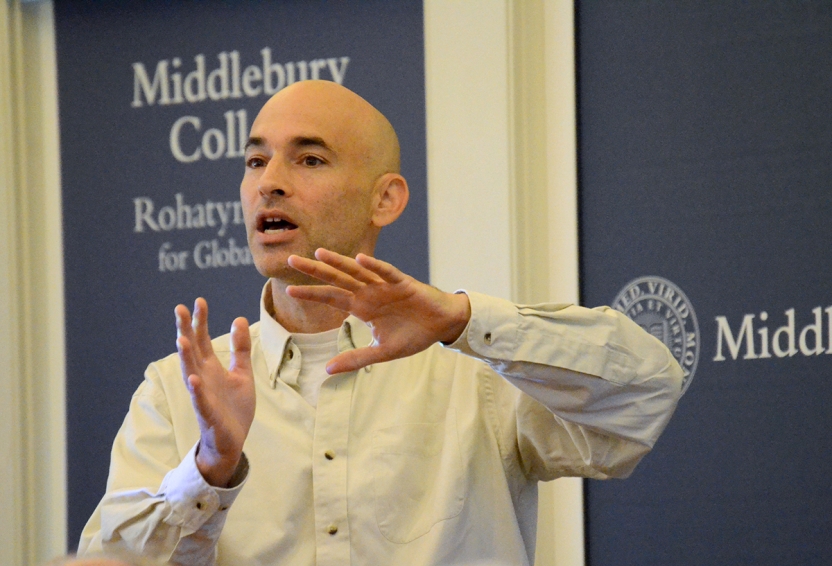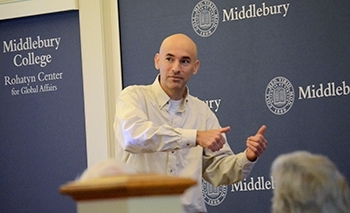Where Is the Palestinian Flag at Israeli Soccer Stadiums?

MIDDLEBURY, Vt. – An expert on the national identity of Palestinian citizens in Israel drew attention to what he described as a “fascinating paradox” at Israeli soccer matches, in a talk given on October 30 at Middlebury’s Rohatyn Center for Global Affairs.
University of Florida sociologist Tamir Sorek said he has attended dozens of professional soccer games in Israel with players of Arab or Palestinian descent on the field, and yet he has never seen a single Palestinian flag flown in the stands as an expression of nationalism.
And since displaying a Palestinian flag is perfectly legal in Israel, what is the significance of this unexpected occurrence?
The director of the Rohatyn Center, Professor Tamar Mayer, set the stage for an audience of about 60 students, faculty, and community members gathered inside the Robert A. Jones ‘59 House.
“It is well known that sport is inseparable from modern nationalism,” said Mayer, “but the connection between sport and nationalism goes beyond the construction of the nation. As flags fly high around the stadium and anthems are sung at every match, the connection between the team, the respective fans, and the nation is reinforced regularly, further deepening national identities and forever reconstructing the nation.”
Sorek, the guest speaker, also provided some background. “Ethno-national flagship teams like the Basque of Athletic Bilbao or Barcelona in Catalonia often turn the soccer stadium into a central location for the expression of nationalism.”
Thus, Sorek said, one could reasonably expect to find demonstrations of Palestinian pride at Israeli soccer matches since Palestinians are a vocal minority in Israel and because 40 percent of the teams in the Israeli Football Association are Arab. All of which begs the question: “Where are the flags?”

-350a” title=”sorek-350a” width=”350” height=”213” />
The guest speaker has concluded that soccer is used by Palestinian fans “to achieve acceptance as legitimate citizens of Israel.” For them to fly a Palestinian flag at an Israeli Premier League match would signify an “act of protest… which is part of the unwritten code of Jewish-Arab relations in Israel.”
Bringing a Palestinian flag into an Israeli soccer stadium would be tantamount to an expression of protest, which Palestinians are reluctant to do in the sports arena, he said. (For the purpose of his talk Sorek excluded the Palestinians living in the West Bank and Gaza Strip.) The Arab citizens of Israel have “compartmentalized” their public spaces as a political strategy.
“In this context, soccer in Israel has been shaped as an integrative sphere, while national protest has been canalized to specific memorial events and sites,” asserted the sociologist Sorek, whose new book is titled “Palestinian Commemoration in Israel: Calendars, Monuments, and Martyrs” (Stanford University Press, 2015),
The integrative orientation of soccer “reflects the interests of both the Arab fans and the Hebrew media,” Sorek said, adding that “the cycles of violence” and “growing pressure” on Palestinians inside Israel is finally causing some “cracks” in the foundation. Sorek implied that Palestinian fans might be bringing their flags to the stadium in the not-too-distant future.
- With reporting and photography by Robert Keren

